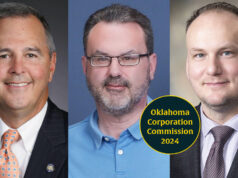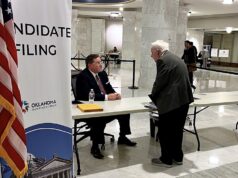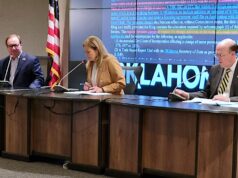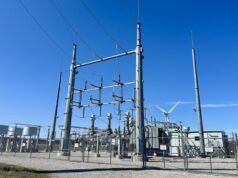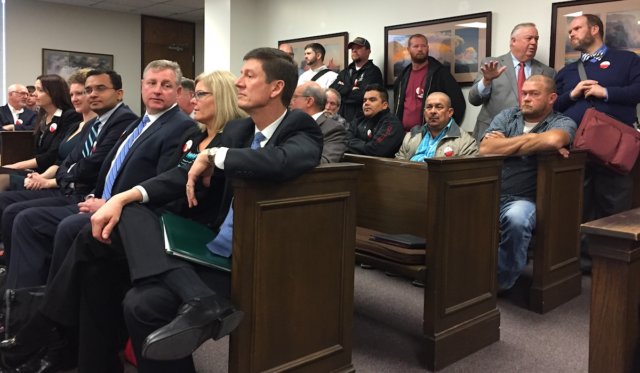
More than an hour into discussion of Public Service Company of Oklahoma’s Wind Catcher project application today, Corporation Commissioner Todd Hiett tried to summarize the question before him.
“Does this benefit PSO’s customers or does it harm PSO’s customers long term?” Hiett asked rhetorically in a Corporation Commission courtroom packed with Wind Catcher supporters and lawyers representing opponents. “Really the question is not so much, ‘What does it do for X community or what does it do for one part of the state, the question is, ‘What does it do for PSO’s customers?’”
To hear PSO attorney Jack Fite tell it, the 800 General Electric 2.5 megawatt turbines planned for the Oklahoma panhandle would be a critical “hedge” on the price of natural gas over the next 25 years for the company’s customers.
“This is a very ambitious project. This is a project which is based upon the desire to save the customers of Public Service Company of Oklahoma literally hundreds of millions of dollars over a 25-year period,” Fite said during oral arguments. “In the past, PSO had diversity on their system with coal and gas. With the environmental rules that came about, PSO chose to shutdown one of their coal units, so therefore they became more dependent on gas, and they also need to diversify. So this project is a perfect way for PSO to diversify their energy needs between gas and between wind instead of coal.”
But an administrative law judge filed a recommendation Feb. 12 that opposed approval of the Wind Catcher project. Multiple attorneys told commissioners they support the ALJ finding Wednesday.
“I think the ALJ’s opinion is an excellent opinion,” said Mike Hockley, attorney for Novus Windpower, a company that has plans for 600 megawatts of wind turbines that abut the proposed Wind Catcher project. Hockley said Novus feels squeezed by the other project and needs only to find an electricity consumer to move forward with its smaller project.
Part of the Wind Catcher project includes 350 miles in new transmission lines from the panhandle to PSO’s grid in the Tulsa area and beyond into Arkansas and Louisiana, but even that component has drawn criticism from other transmission companies.
“There are significant structural burdens in the plan proposed by PSO,” said Deborah Thompson, an attorney representing South Central MCN, LLC, a Missouri-based transmission company that operates existing infrastructure in the Oklahoma panhandle. “To separately build a spiderweb of facilities over South Central’s footprint realizes no traditional transmission planning efficiencies, system optimization or improved reliability. All this while simultaneously causing uncertainty in the ability to make other long-term planned investment that might overlap with what PSO proposes to build.”
Walmart on board for renewable reasons
Earlier Wednesday, Fite and PSO had asked for delaying oral arguments in an effort to strike settlement agreements with any entities that have expressed concern about Wind Catcher. Last week, PSO announced it had reached an agreement with Walmart, which buys energy from the company.
“This project is attractive to Walmart because it will help them meet some of their own renewable energy goals,” Rick Chamberlain, attorney for Walmart, told commissioners. “The long-term goal is to be supplied by 100-percent renewable energy for all of their operations. The more immediate (goal is) 50 percent by 2025 by a combination of on-site development and purchases from other utility-scale providers.”
Hiett asked Chamberlain whether Walmart was supportive of the Wind Catcher project for reasons other than the company’s renewable energy goals — chiefly, whether the company anticipated lower electricity rates over a 25-year projection.
“I did not go that far,” Chamberlain ultimately said.
Corporation Commissioner Bob Anthony offered statements about the value of companies like Walmart and Google wanting renewable energy such as wind power, but Hiett noted not all consumers have the same goal.
“Some PSO customers are just looking for the lowest-cost, reliable power,” Hiett said.
But nearly four hours later, Hiett and Chamberlain resurrected their discussion. Once again facing the question of whether Walmart expects to see benefits in its electricity costs from the Wind Catcher project, Chamberlain said, “Yes.”
Wind Catcher would be the largest wind generation project in North America, if approved.
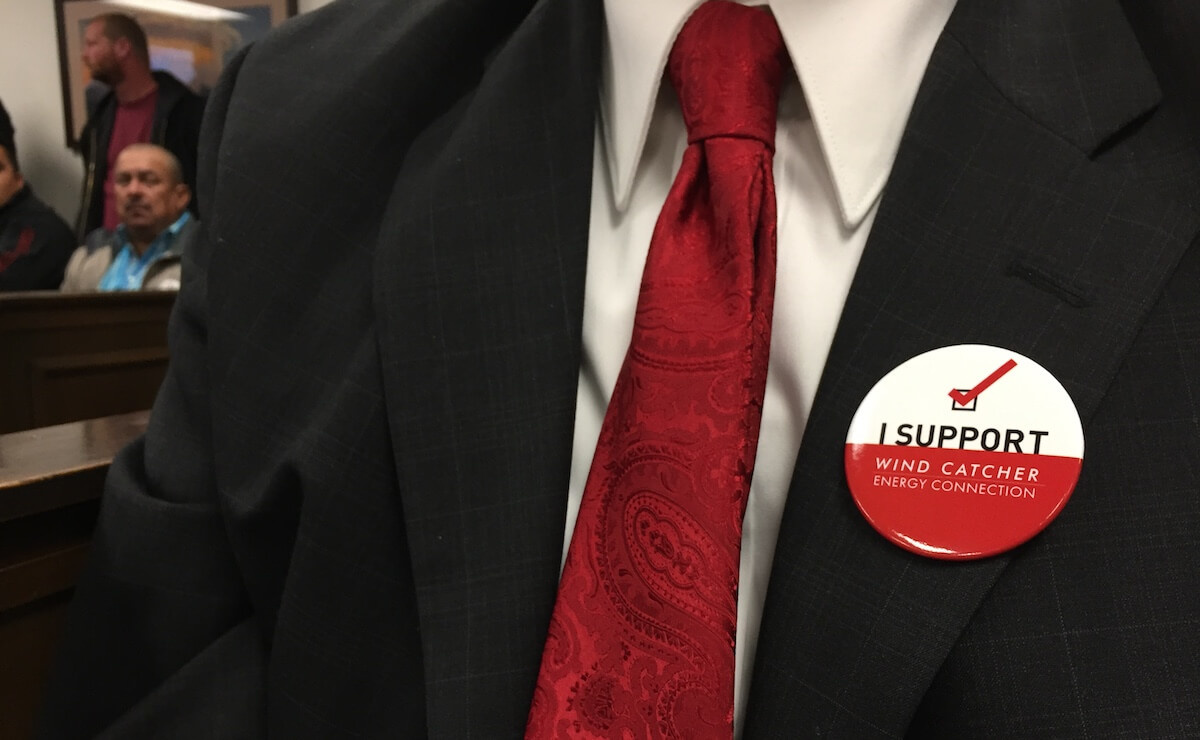
‘I sure hope that tax does not get imposed’
Among other items attorneys discussed Wednesday was the projected price of natural gas during the next 25 years. David Keglovits, an attorney for the Windfall Coalition, brought graphs to the podium as he highlighted what he called “significant methodological problems” in the projections done by American Electric Power, PSO’s parent company.
“AEP admits in testimony in this courtroom that its model is generated by a closed process. AEP provides subjective judgments,” Keglovits said. “They made up a carbon tax. There’s no carbon tax in the law. But they made up a carbon tax. There is no wind tax in their model. Is there one right now in Oklahoma? No, but we know what’s going on right now in the Legislature and there very well could be one.”
Keglovits should know, as the Windfall Coalition features Continental Resources CEO Harold Hamm and Jeff McDougal, president of JMA Energy, as board members. Hamm and other oil and gas industry executives have been pushing for a new $1-per-megawatt-hour tax on wind turbines.
“I think that should be looked at on the economics of the project,” said Tom Schroedter, an attorney for the Oklahoma Industrial Energy Consumers. “I sure hope that tax does not get imposed.”
If approved, the Wind Catcher project would not receive state tax credits, which have been terminated for new projects. Wind Catcher would benefit from federal tax credits, and Keglovits critiqued AEP for estimated revenue returns for the publicly traded company.
“Wall Street and AEP think this is a great project,” Keglovits said. “Somehow by investing $4.5 billion they’ve bought a hedge on natural gas. Is anybody promising you an energy price for the customers? Absolutely not.”
But in his rebuttal to the half-dozen attorneys presenting against Wind Catcher, Fite pointed to “guarantees” in the PSO application.
“The customers would be reimbursed by the company if there (are) more costs than benefits for the first 10-year period,” Fite said. “I cannot emphasize enough the net-benefits guarantee.”
Fite offered a complex explanation for the much-maligned natural gas-price forecasts provided by PSO, but he said the other attorneys who spoke Wednesday were conflating short-term forecasts with long-term projections.
“So what all these folks are saying is these gas forecasts are off but they are off because they are comparing the next three or four years — which, our project isn’t online yet — with a long-term forecast,” Fite said.
He alluded to the specific business interests who had spoken against Wind Catcher.
“This company isn’t just looking for a place to spend a buck. This is a project where we’ve really put our best foot forward in an attempt to get people comfortable,” Fite said. “We obviously haven’t gotten this table over here comfortable, but I don’t think there’s anything we could do for some people with their business interests.”
Fite said the Wind Catcher proposal is unique and difficult.
“I think part of the problem in this case is that this is an incredibly innovative project. This is thinking out of the box. it is going far beyond what most companies will do for their customers,” Fite said. “I have never seen a project where a company has come in and said, ‘We are going to attempt to save our customers money for 25 years.’ Now, are we going to make some money on the project? Hopefully, if we aren’t having to pay out on all of these guarantees. But what is wrong with that?”
Corp. Comm. decision pending
Oklahoma Attorney General Mike Hunter has opposed the Wind Catcher project on the argument that he believes it will cost ratepayers in the long run.
“This project is unnecessary,” Jared Haines, deputy chief attorney general, argued Wednesday. “It does not make good money sense, it was developed behind closed doors without stakeholder input.”
Corporation Commissioner Dana Murphy concluded Wednesday’s hearing by telling PSO and the other entities represented to approach their scheduled Friday meeting prepared to work toward potential settlement agreements.
“I would strongly encourage the company to proceed in that regard and try to work with the parties,” she said.
The Corporation Commission adjourned having taken the issue under advisement, which means a decision is pending.
(Editor’s note: Public Service Company of Oklahoma is currently advertising on NonDoc. The story was also updated at 7:27 p.m. to clarify how Walmart purchases electricity from PSO.)










